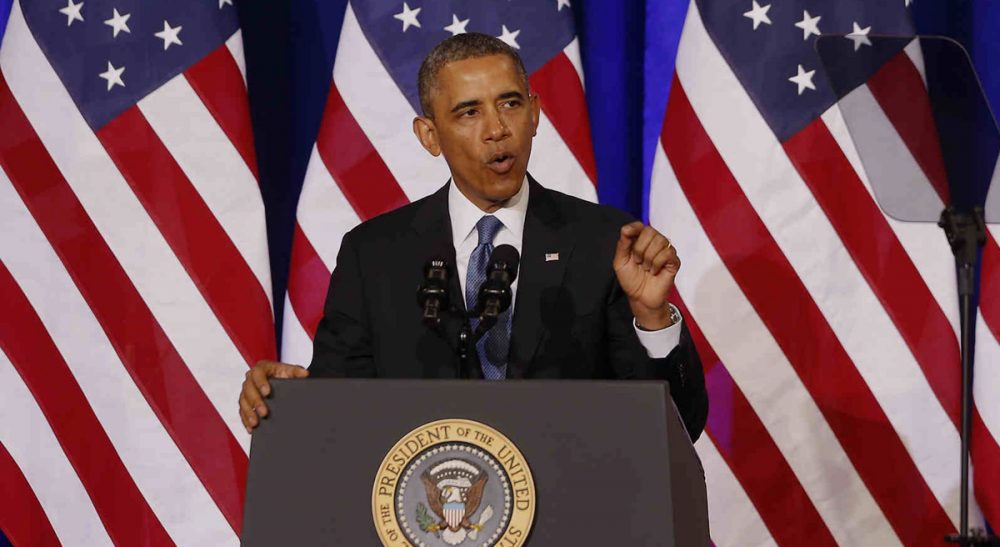Advertisement
Obama’s NSA Speech: Lofty Rhetoric Must Be Matched By Action

President Barack Obama opened today’s long-heralded speech promising to reform the NSA surveillance machine by invoking Boston’s Sons of Liberty. This patriotic group, he said, “would patrol the streets, reporting back any signs that the British were preparing raids against America’s early Patriots.” President Obama’s point, apparently, was that these Sons of Liberty were gathering intelligence, just like the NSA does today.
That is wrong. The Sons of Liberty were whistleblowers, just like the man who can claim the most credit for President Obama’s speech today: Edward Snowden.
The president failed to note that those early Boston patriots, who included Samuel Adams and Paul Revere, were targeted by their government largely because they opposed the crown’s unfettered use of “General Writs” to seize and rifle through American’s personal papers and effects without a warrant — precisely what the government has been doing with its metadata dragnet of ordinary Americans today. And the Sons of Liberty took action because, in their view, the government’s actions were oppressive.
King George surely regarded Sam Adams and Paul Revere with the same disdain that President Obama clearly holds for Edward Snowden today.
It’s also clear that, despite President Obama’s claim that he had been planning to reform the nation’s secret spying network before the avalanche of leaks by Snowden, the president is discussing the issue reluctantly and only in response to six months of Snowden revelations about the breathtaking extent of government surveillance.
Unless his deeds match his lofty words, President Obama will go down in history for having retained and expanded George W. Bush’s surveillance programs rather than reformed them.
To be sure, President Obama’s speech was wrapped in the noble rhetoric of American values and constitutional protections. But the reality is that the president failed to embrace many of the basic civil liberties protections recommended by his own panel of privacy advisers.
Sure, he promised to stop spying on friendly foreign heads of state with whom he has to hobnob. But that’s meaningless: they all no doubt have taken steps to encrypt or otherwise protect their calls from the White House’s prying ears.
He also promised that the NSA would “only pursue phone calls that are two steps removed from a number associated with a terrorist organization instead of three.” But do the math: the number of people tracked even with that limit nonetheless expands exponentially.
President Obama also called on Congress to establish a panel of public advocates who can represent privacy interests before the secret Foreign Intelligence Surveillance Court. That’s a welcome change, but as long as the surveillance framework grants the NSA broad powers to spy on innocent Americans, it isn’t nearly enough.
Other steps that the president’s advisers recommended, but which he has not taken, include prohibiting the NSA from asking companies to insert back doors into their software so it can gain access to encrypted communications and networks, appointing a civilian to be the next director of the NSA, and dividing command of the NSA’s cyberwarfare and cybersecurity units.
Given President Obama’s reluctance to adopt the reforms that his own privacy experts recommend — and the fact that the next commander in chief could simply rescind the president’s directive — we must demand that Congress act.
A bipartisan bill, the USA Freedom Act, would go a long way toward restoring American’s trust in their government by putting in basic — and hardly radical -- privacy protections. The bill has support from leaders in both political parties, as well as from industry and civil liberties groups. Here in Massachusetts, it is being sponsored by both Senators Warren and Markey, and many of our representatives. Note, however, that not all our representatives have stepped up to defend our liberties: Rep. Kennedy, Rep. Tsongas, Rep. Neal, Rep. Clark and Rep. Lynch all await your call asking them to sponsor USA Freedom.
If both President Obama and Congress fail to act on this matter, today’s leaders will effectively be handing off the unchecked power to spy on ordinary Americans to all future presidents — including those who you may not trust.
“[B]ecause of the strength of our own democracy, we should not shy away from high expectations,” President Obama intoned. “For more than two centuries, our Constitution has weathered every type of change because we have been willing to defend it, and because we have been willing to question the actions that have been taken in its defense. Today is no different. Together, let us chart a way forward that secures the life of our nation, while preserving the liberties that make our nation worth fighting for.”
That’s important and patriotic rhetoric from our president. But unless his deeds match his lofty words, President Obama will go down in history for having retained and expanded George W. Bush’s surveillance programs rather than reformed them. That would be a terrible legacy for anyone, but especially for someone who values the Sons of Liberty.
Related:
